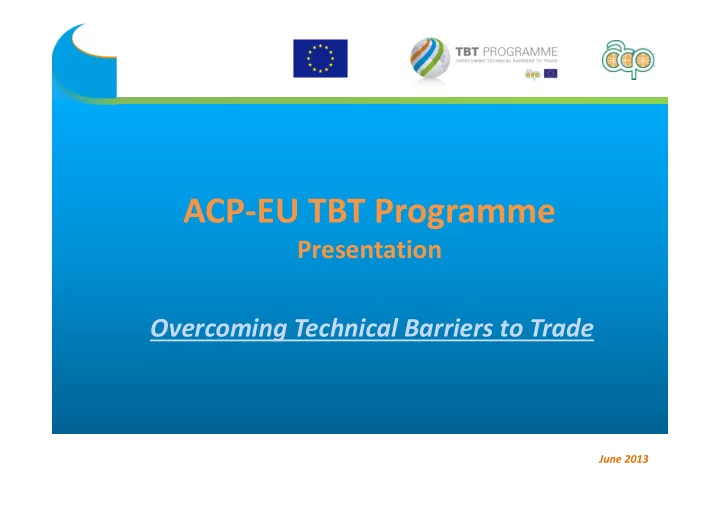

ACP ‐ EU TBT Programme Presentation Overcoming Technical Barriers to Trade June 2013
1 Overview 1. RATIONALE 2. GENERAL PRESENTATION 3. AREAS OF INTERVENTION 4. OUR VISION OF THE PROGRAMME 5. BENEFICIARIES 6. TYPE OF SERVICES 7. ELIGIBILITY 8. PROJECTS AND EVENTS IN PIPELINE 9. CONCLUSION 10.PMU TEAM 11.CONTACT DETAILS 2
2 1. Rationale S tandards and health related measures play a critical role in shaping the flow of global trade . Nowadays, Non ‐ Tariff Barriers are becoming the major impediments to international trade. 3
2 1. Rationale While tariffs still constitute an important source of distortions and economic costs, the relative role of tariffs in shaping global trade has declined due in large part to successful “rounds” of multilateral tariff reductions in the GATT and the WTO. 4
2 1. Rationale Non tariffs barriers will become the main challenge of the future multilateral trade system. 5
2 1. Rationale Based on a close collaboration , the EU Commission and ACP Group have decided to cope with this new challenge with initiatives related to: Sanitary and Phytosanitary measures (SPS): The All ‐ ACP programmes “PIP” and “EDES”, 2009 Technical barriers to trade (TBT): the New ACP ‐ EU TBT Programme, 2013 6
3 2. General presentation The ACP ‐ EU TBT Programme general objective is to contribute to improved competitiveness and access export markets Duration: 48 months Total cost: 15 Million € First Implementation Period: May 2013 – October2014 Office location: Brussels, Belgium 7
4 3. Areas of intervention Area 1: Upgrading and Strenghtening Quality Infrastructure Institutions Area 2: Empowering Economic Operators and Export Sectors Area 3: Disseminating Results and Experiences 8
4 3. Areas of Intervention Area 1: Support to Quality Infrastructure Institutions 1. Strengthening of Standardisation Bodies 2. Strengthening Metrology Laboratory Capacities 3. Strengthening Product Testing Laboratories 4. Supporting Capacity Building activities for Accreditation purposes 9
4 3. Areas of Intervention Area 2: Support to Economic Operators, and Export Sectors 1. Training of trainers on understanding and implementation of the WTO TBT Agreement from a business perspective 2. Preparation of Training modules and materials on HACCP and ISO 22000 systems 3. Train the Trainers courses on Quality Management Systems and their Enforcement in industrial Sectors 10
4 3. Areas of Intervention Area 2: Support to Economic Operators, and Export Sectors 1. Seminars on the enforcement of Food Safety Management Systems 2. Support the preparation of training modules and materials on good practices 3. Training workshop on tools and techniques to implement and run an effective HACCP plan along a food supply chain 11
4 3. Areas of Intervention Area 3: Support to Dissemination of Results and Experiences within ACP Region 1. Supporting Existing Sectorial Platforms for Dialogue 2. Facilitating Exchange of Experience and Regulatory Best Practices 3. Strengthening Interactive Communication between Stakeholders, Economic Operators and Trade Related Regulators 12
5 4. Our vision of the Programme Global Value Chain Approach On of the main objectives of the Programme is to enable producers, government agencies and other stakeholders to apply TBT standards and regulations and through that gain and maintain market access. That means looking at the whole value chain including market opportunities and constraints to improve trade and integrate the global trade value chain . 13
6 5. Beneficiaries All ACP States ACP quality and regulatory infrastructure institutions ACP Regional Organisations ACP Government Ministries and departments responsible for trade matters ACP Civil society & Private sector organisations Other relevant stakeholders playing an active role in achieving the objectives of the TBT Programme 14
6 5. Beneficiaries All ACP States are eligible Each ACP State should have its own strategy 15
7 6. Type of services Technical Assistance Studies, reviews and regulatory impact assessments Training Twinning, mentoring and training via the EC’s and EU Member States’ QI and regulatory offices Grants Support to existing sectoral platforms for dialogue Facilitation of exchange of experience and best practices 16
8 7. Eligibility ELIGIBILITY CRITERIA Better understanding of good regulatory frameworks and the use of international standards Better compliance of ACP countries to their WTO commitments Building capacity within the appropriate technical institutions Prioritisation of capacity building needs Strengthening institutional capacity to implement trade policies and agreements 17
8 7. Eligibility ELIGIBILITY CRITERIA Better compliance with TBT on external markets Promotion of intra and inter regional development, harmonisation, equivalence and mutual recognition Enhancement the regulatory, technical, scientific and management skills of staff working in QI institutions Trade ‐ related knowledge and skills transfer to ACP expertise Association in trade policy formulation 18
9 8. Current projects ‐ events Communication events: ‐ Geneva Week, WTO, Geneva, May 2013 ‐ 19th ARSO GA, Yaounde, June 2013 ‐ COMESA Seminar, Nairobi, September 2013 ‐ ECOWAS Seminar, Cotonou, October 2013 ‐ Meetings with International Organisations (UNIDO, ISO, WTO, ITC, COLEACP…) Requests and Projects under process: ‐ African Union, UEMOA, The Gambia, Zimbabwe, Uganda, Mauritania, Tanzania, Dominican Republic 19
10 9. Conclusion The ACP ‐ EU TBT Programme is DEMAND ‐ DRIVEN and as such the ACP countries and the Regional Organisations of the QI sector are expected to play an active role to make sure they individually and collectively benefit from this programme and that the Programme can support to overcome their technical barriers to trade 20
11 10. The PMU Team Ambassador Lingston Cumberbatch , Programme Director Ambassador Shree Baboo Chekitan Servansing , Team leader Mrs. Frédérique Brosseau , Programme Administrator Mr. Carlos Calcopietro , Programme Monitoring Expert Mr. Bruno Doko, PhD, Expert in Technical Barriers to Trade Ms. Caroline Garcia , Programme Communication Expert Mr. Bernard Kalonji , Programme Assistant
12 11. Contact details ACP ‐ EU TBT Programme Avenue de Tervuren 32 box 31 1040 Brussels Belgium Tel: +32 2 739 0000 Fax: +32 2 739 0009 E ‐ Mail: contact@acp ‐ eu ‐ tbt.org Web Site: http://www.acp ‐ eu ‐ tbt.org 22
Recommend
More recommend